Uncovering a literacy for AI
Date: 12 October 2023
Speaker: Sarah Jones
Literacies have been well documented from media to the digital and more recently immersive. With an increase in the use of generative AI tools and the impact that this is having on an increasing number of sectors, this talk will argue for the need for an AI literacy. It will examine frameworks for understanding how to use artificial intelligence and the need to be constantly evolving our thinking when it comes to technology. |
The limitations of #BlackLivesMatter for anti-racist activism in the global south
Date: 19 October 2023
Speaker: Suntosh Pillay
It is unlikely that you know the name Collins Khosa. However, you would know the name George Floyd. This is no accident. The media, as a global epistemic authority, produces, polices and perpetuates a knowledge system that favours the Global North. I present a comparative analysis of the murders of Khosa in South Africa (April 2020) and Floyd in the U.S. (May 2020). Despite its quasi-universal appeal, Black Lives Matter (BLM) has an ironic proximity to whiteness within the United States that provide BLM with epistemic advantages not enjoyed elsewhere, especially in poor ‘township’ contexts of South Africa. I argue that anti-racist activism in global south contexts must guard against uncritically importing northern-centric forms of protest, such as #BlackLivesMatter. The US has particularities that distracts the media gaze, (mis)directing social justice activism away from black lived experiences in countries such as South Africa, reinforcing silences, epistemic injustices, and colonial continuities. |
Media Literacy: A Strategy for Risk Management in an Uncertain World
Date: 26 October 2023
Speaker: Tessa Jolls
With new AI technologies, as well as the cacaphony of voices that have emerged through social media, it is clear that the call for a media ecosystem that only contains “the truth” or that contains little or no misinformation or disinformation is a utopian dream that only invites more discord and polarization, or worse, highly contestable labelling and censorship. Meaning lies in the minds and hearts of information users, and with this recognition, media literacy offers a pathway toward dialogue and risk management strategies that encompass both qualitative and quantitative analyses and reflection, based on a fundamental understanding of media as a global symbolic system. With this in mind, media literacy offers the questions — not “the answers” — for exploring and interrogating media in all its forms, individually and collectively. This empowerment enables wiser choices throughout life and societies. |
Global South’s over-reliance on science news from Global North: causes, consequences and solutions
Date: 2 November 2023
Speaker: An Nguyen
Developing countries rely heavily on the developed world for not only scientific expertise but also science news output. From Africa and the Middle East to South America and developing parts of Asia, a large proportion of science news consumed in the Global South has been found to be translated or, at best, synthesised from foreign sources, especially global media outlets based in the Global North. Such reliance is a double-edged sword: while it helps to enhance general awareness and understanding of global science developments in the Global South, this double-layered structure of dependency bears many negative long-and short-term implications for local and global development. Drawing on recent content analyses and in-depth interviews with science journalists in Southeast Asia and the Middle East, this paper will address this critically important, but rarely studied, phenomenon. I will discuss the causes and impacts of such over-reliance on foreign sources and offers some thoughts on potential solutions to the problem. In general, this requires a holistic approach and international cooperation efforts to address the many traditional shortfalls of science and science news cultures in the Global South. |
Transnational Assemblages: Social Justice and Communication During Disaster
Date: 9 November 2023
Speaker: Sweta Baniya |
The Power of Podcasting: Audio Storytelling Beyond Entertainment
Date: 16 November 2023
Speaker: Kayla Jones
With the rise in popularity of audio listening, podcast studies is a growing field of research that is responding to podcasts that have gone mainstream, such as Serial. Audio storytelling podcasts can be a powerful tool to advocate for, connect with, and educate global audiences. Through creating her own podcast, Kayla explored the ways storytelling podcasts can tell multilayered narratives beyond the realm of entertainment and in non-fiction settings, like heritage and tourism. |
Algorithms and the Climate Emergency: An Ecomedia Literacy Perspective
Date: 23 November 2023
Speaker: Antonio Lopez
Whether it’s blockchain technologies or disinformation, Big Tech algorithms have a significant environmental impact. The economic models of surveillance and carbon capitalism are both based on extractivism, so data harvesting and resources extraction practices mirror each other in Big Tech algorithms. To encourage a holistic environmental analysis of algorithms, ecomedia literacy’s four zone approach enables an investigation from the perspectives of ecoculture, political ecology, ecomateriality, and lifeworld. For media literacy educators and reformers, the challenge is to develop curricula and methods that address these different standpoints, which can include critical media literacy, design justice, civic media literacies, news and misinformation literacies, and ethical algorithm audits. |
The art of presence
Date: 30 November 2023
Speaker: Andrea Winkler-Vilhena
Throughout history the Arts have been used to address societal issues, to see and show the world in diverse ways, and to imagine and create new futures. Nowadays, every aspect of life has become so entangled with digital media that it is impossible to speak about the world without considering the effects they have on our lives. How do we relate to and interact with people when our attention is absorbed by digital gadgets? What does presence mean in a world in which a big part of human relationships and communication happens in virtual spaces? In this lecture we will explore how the Arts can be used to promote media literacy and how seeing, interacting with and making art can revive our sense of presence and promote care and imagination. |
Youth digital activism and online media: from digital exclusion to the complexities of civic participation
Date: 7 December 2023
Speaker: Annamaria Neag
Since the second half of the 2000s, there has been an increasing interest in the relationship between internet use and civic participation. While initially this interest was geared towards the adult population, researchers have shifted their attention to young people and their activism in the digital sphere. In this talk, I will present the research findings of our ongoing project focusing on young people in the CEE region (namely, the Czech Republic and Hungary) and their (online) involvement in the Fridays for Future movement. We first mapped the online public discourse on youth civic participation in these two countries and then focused on young people’s views on activism and the digital skills needed to participate. Our results show that online commenters use specific strategies to exclude young people from the public sphere. When it comes to young people and their views on digital activism, we found that digital media plays a rather complex and contradictory role in their civic participation, with its affordances providing both opportunities and challenges in terms of mental well-being, non-formal education and community-building. |
Shrinkage and Activist Affordances: How disabled people improvise more habitable worlds
Date: 14 December 2023
Speaker: Arseli Dokumaci
For people living with disability, everyday tasks like lifting a glass or taking off clothes can be daunting. As such, their undertakings may require ingenuity, effort and artfulness. In this talk, I draw on visual ethnographies with disabled people living in Turkey and Quebec, and trace the immense labour and creativity that it takes for them just to navigate the everyday. Bringing together theories of affordance, performance, and disability, I propose “activist affordances” as a way to name and recognize these extremely tiny and yet profoundly artistic choreographies that disabled people have to continually rehearse to make the world more habitable for themselves and others. Activist affordances, in the way I define them, are micro, often ephemeral acts of world-building, with which disabled people literally make up, and at the same time make up for, whatever affordances fail to materialize in their environments. Activist affordances are not like any other affordance in that their creation emerges from constraints, losses and precarity that I broadly conceptualize as “shrinkage”. It is within a shrinking world of possibilities, that it becomes necessary to create affordances in their physical absence, which is why I call them “activist”. Even as an environment shrinks to a set of constraints rather than opportunities, the improvisatory space of performance allows disabled people to imagine that same environment otherwise through activist affordances, presenting the potential for a more livable and accessible world. |
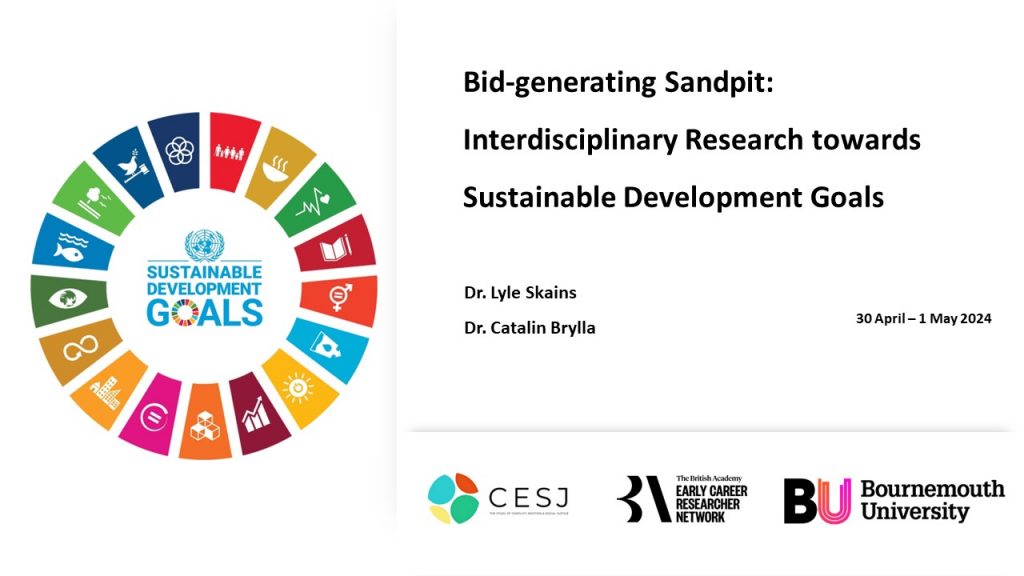 27 early career academics from ten universities came together 30 April-1 May in Bournemouth for a two-day sandpit funded by The British Academy Early Career Researcher Network and organised by Dr. Catalin Brylla (Centre for the Study of Conflict, Emotion, and Social Justice) and Dr. Lyle Skains (Centre for Science, Health, and Data Communication Research). The participants specialise in a variety of disciplines such as performance, media, business management, environmental sciences, anthropology, computing, architecture, law, engineering, tourism, and health studies. They brought their interests in a sustainable world and society (as represented by the UN Sustainable Development Goals) to the sandpit for networking, team-building, and funding and project development workshops, many of which were based on the successful and innovative NESTA-developed ‘Crucible’ programme (no longer online, but see the Welsh Crucible).
27 early career academics from ten universities came together 30 April-1 May in Bournemouth for a two-day sandpit funded by The British Academy Early Career Researcher Network and organised by Dr. Catalin Brylla (Centre for the Study of Conflict, Emotion, and Social Justice) and Dr. Lyle Skains (Centre for Science, Health, and Data Communication Research). The participants specialise in a variety of disciplines such as performance, media, business management, environmental sciences, anthropology, computing, architecture, law, engineering, tourism, and health studies. They brought their interests in a sustainable world and society (as represented by the UN Sustainable Development Goals) to the sandpit for networking, team-building, and funding and project development workshops, many of which were based on the successful and innovative NESTA-developed ‘Crucible’ programme (no longer online, but see the Welsh Crucible).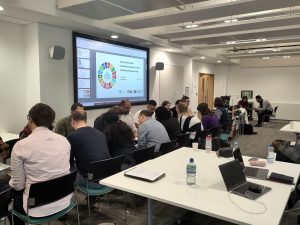 The success of the sandpit’s activities is highlighted by the culmination of six projects proposed to a panel of subject experts from Bournemouth University: Prof. Amanda Korstjens (ecology), Prof. Adele Ladkin (business), Prof. Huseyin Dogan (computing), Dr. Lyle Skains (arts practice and interdisciplinarity), Dr. Catalin Brylla (media practice) and Zarak Afzal (research development). These experts provide mentorship and feedback on the projects as they develop toward funding proposals. Two sandpit follow-up sessions will also aid the participants in developing their funding proposals.
The success of the sandpit’s activities is highlighted by the culmination of six projects proposed to a panel of subject experts from Bournemouth University: Prof. Amanda Korstjens (ecology), Prof. Adele Ladkin (business), Prof. Huseyin Dogan (computing), Dr. Lyle Skains (arts practice and interdisciplinarity), Dr. Catalin Brylla (media practice) and Zarak Afzal (research development). These experts provide mentorship and feedback on the projects as they develop toward funding proposals. Two sandpit follow-up sessions will also aid the participants in developing their funding proposals.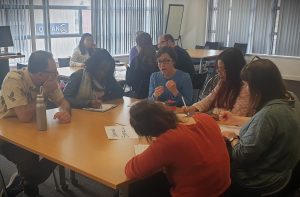 This is the first ‘crucible’ sandpit of its kind offered through the BA ECRN, though plans are under development for further offerings in both the Southwest and other regional hubs.
This is the first ‘crucible’ sandpit of its kind offered through the BA ECRN, though plans are under development for further offerings in both the Southwest and other regional hubs.
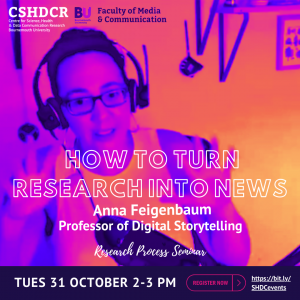
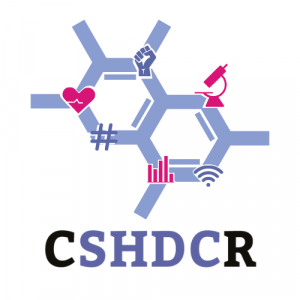
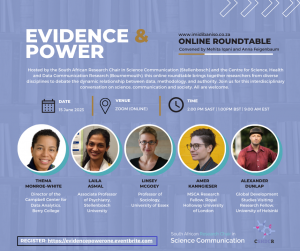











 UKCGE Recognised Research Supervision Programme: Deadline Approaching
UKCGE Recognised Research Supervision Programme: Deadline Approaching SPROUT: From Sustainable Research to Sustainable Research Lives
SPROUT: From Sustainable Research to Sustainable Research Lives BRIAN upgrade and new look
BRIAN upgrade and new look Seeing the fruits of your labour in Bangladesh
Seeing the fruits of your labour in Bangladesh Exploring Embodied Research: Body Map Storytelling Workshop & Research Seminar
Exploring Embodied Research: Body Map Storytelling Workshop & Research Seminar ECR Funding Open Call: Research Culture & Community Grant – Apply now
ECR Funding Open Call: Research Culture & Community Grant – Apply now ECR Funding Open Call: Research Culture & Community Grant – Application Deadline Friday 12 December
ECR Funding Open Call: Research Culture & Community Grant – Application Deadline Friday 12 December MSCA Postdoctoral Fellowships 2025 Call
MSCA Postdoctoral Fellowships 2025 Call ERC Advanced Grant 2025 Webinar
ERC Advanced Grant 2025 Webinar Update on UKRO services
Update on UKRO services European research project exploring use of ‘virtual twins’ to better manage metabolic associated fatty liver disease
European research project exploring use of ‘virtual twins’ to better manage metabolic associated fatty liver disease